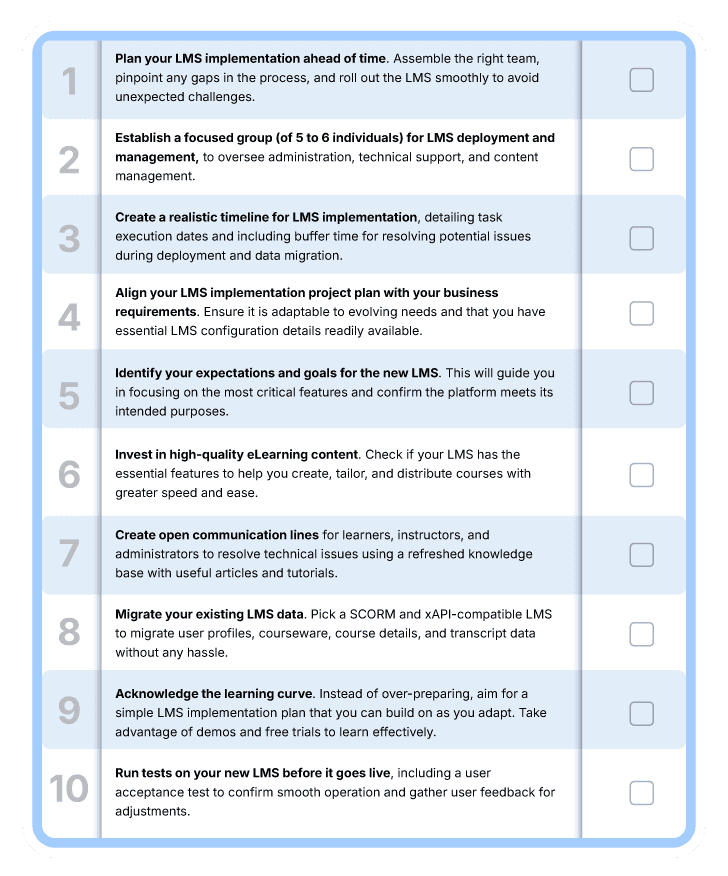How to pick out and launch the best LMS for small businesses in 2025?

Employee training needs are epic, no matter whether you run a small or large business. Companies that provide employees with ongoing learning opportunities enjoy higher retention. 88% of SMBs are retaining their top-tier talent by delivering continuous employee training. Achieving this goal requires adopting the best LMS for small businesses. Today’s corporate LMS market is profuse with a vast array of options. From this extensive platter, how can you choose the best LMS for small companies?
If your startup or small business is planning to make an LMS investment, this piece is for you. In this blog, our LMS expert discusses how to evaluate and implement the best LMS for your small company.
7 Steps to Note When Picking the Best LMS for Small Businesses
The very thought of selecting an LMS could swamp you with a horde of considerations. Here, we have summed up the most relevant aspects into seven easy steps.
Step 1: Define Your Company’s Training Needs
The first step is to analyze and determine your organization’s specific training requirements. Find out what skills your team lacks and what you need them to gain through training. Understand your employees’ learning preferences, needs, and interests. This will help define the goals and objectives of your training initiatives. Also, consider the size of your team and the different formats/ modes of training required.
Step 2: Review the Available LMS Options
Next, you need to scrutinize the different LMS solutions available in the market. Review each tool’s usability, functionality, features, and web and mobile compatibility. Also, look for aspects such as customization, pricing, scalability, and integration with existing systems. If you have any platform-specific requirements, consider the same when evaluating the vendors.
Step 3: Test Each LMS With a Free Trial or Demo
Following the review and research phase, shortlist potential LMS providers. Shortlisting vendors can ease your decision-making process. At this juncture, try to engage in product demos offered by the LMS vendors. Use free trials to get hands-on experience with the LMS platforms. Review the usability and functionality of each LMS. Seek feedback from current users to gauge the effectiveness of each platform.
Step 4: Compare and Make Your Choice
Create a comparison chart of shortlisted LMS options. Analyze the advantages and drawbacks of each LMS. Compare the findings with your business demands and user opinion. Find out how far each vendor can help you with customization. Make an informed decision on the best LMS for your organization.
Step 5: Map Out the LMS Implementation Plan
You can get started with the implementation plan once you have selected a suitable LMS. During the process, you need to configure the LMS, upload or migrate content, and create user accounts. Set up a realistic timeline for the LMS rollout. Assign roles and responsibilities within your company to manage the implementation smoothly. Ensure the LMS integrates well with your existing business applications.
Step 6: Train and Support All Users
User training is essential for hassle-free LMS adoption and utilization. Chart a training plan for your team members without affecting their working shifts. It helps them get used to the LMS in no time. Provide ongoing support and resources for LMS users within your organization. Seek their feedback and reviews to improve the training experience.
Step 7: Oversee and Optimize Training Process and Outcomes
Regular monitoring and gathering of user feedback are essential to determine the effectiveness of the LMS. It allows you to make changes and adapt training to suit the growing demands. Define metrics to gauge the effectiveness of the LMS. Review user engagement and training outcomes periodically to optimize the learning experience.
10-Step LMS Implementation Checklist for Small Businesses
Treat this checklist as a structured template for your LMS rollout plan. The checklist details the critical milestones you must achieve while implementing your LMS. Simply check off each step as you complete it.

It’s Time to Plan LMS Implementation
Many small businesses experience resource limitations when it comes to scaling internal training. Choosing a flexible and scalable LMS enables you to:
The best LMS for small companies helps nurture a skilled and responsive workforce that propels your business forward. Skill Lake is a leading AI-powered LMS designed for businesses of all sizes and natures. We help businesses foster a culture of continuous learning and improvement through effective end-to-end training management. Get your learning hub up and running immediately with Skill lake. Contact us to discuss and discover how Skill Lake can augment your employee training efforts.
Build a culture of continuous learning with Skill Lake’s state-of-the-art people development platform. Give your employees professional training to help them excel in their job roles and propel your business to greater efficiency and success.
Start Today

Aarathy Jayakrishnan
Aarathy is an e-learning professional and enthusiast with a keen understanding of learning and development concepts. She writes insightful content, unraveling the possibilities that e-learning holds, and strives to make education open for all.